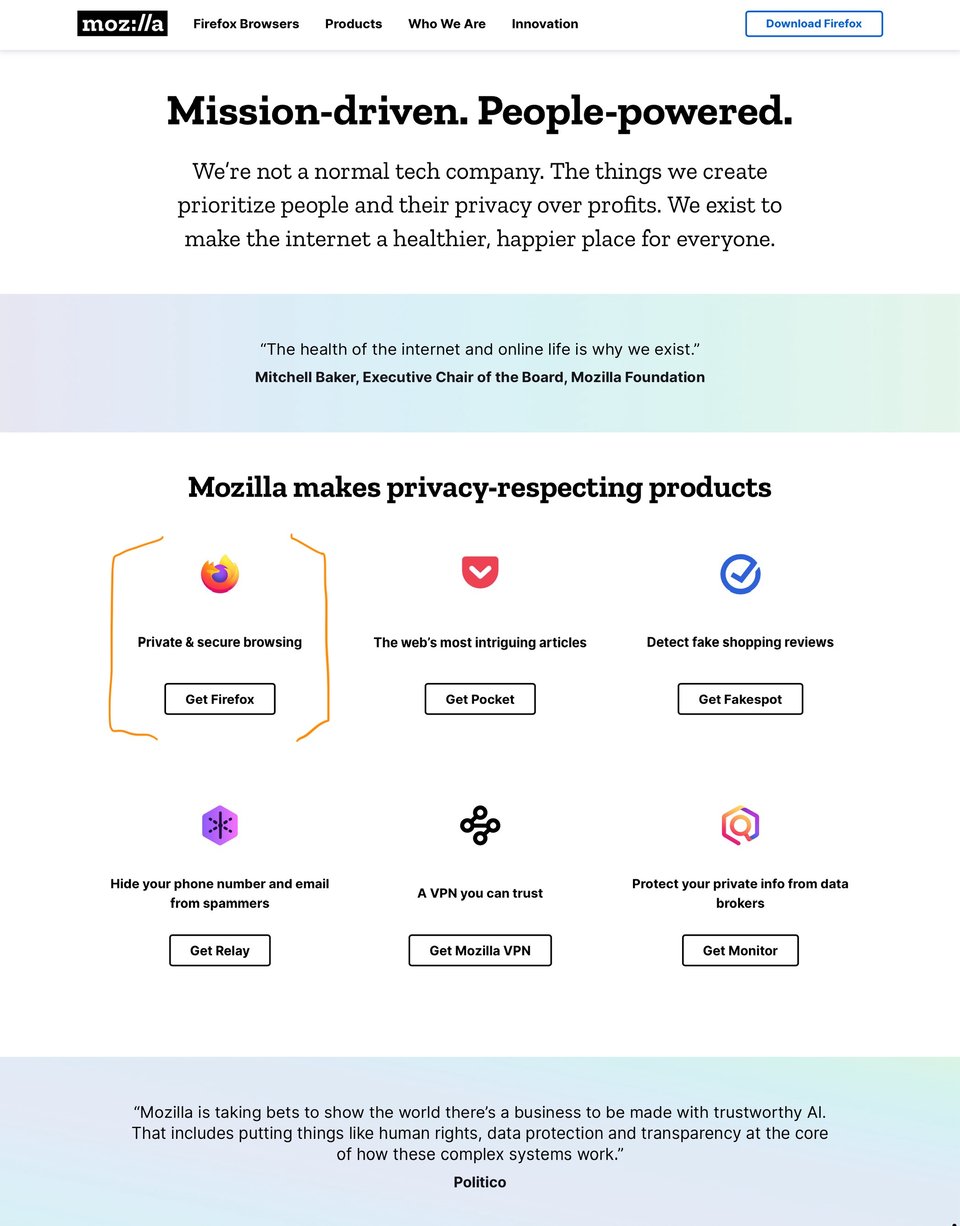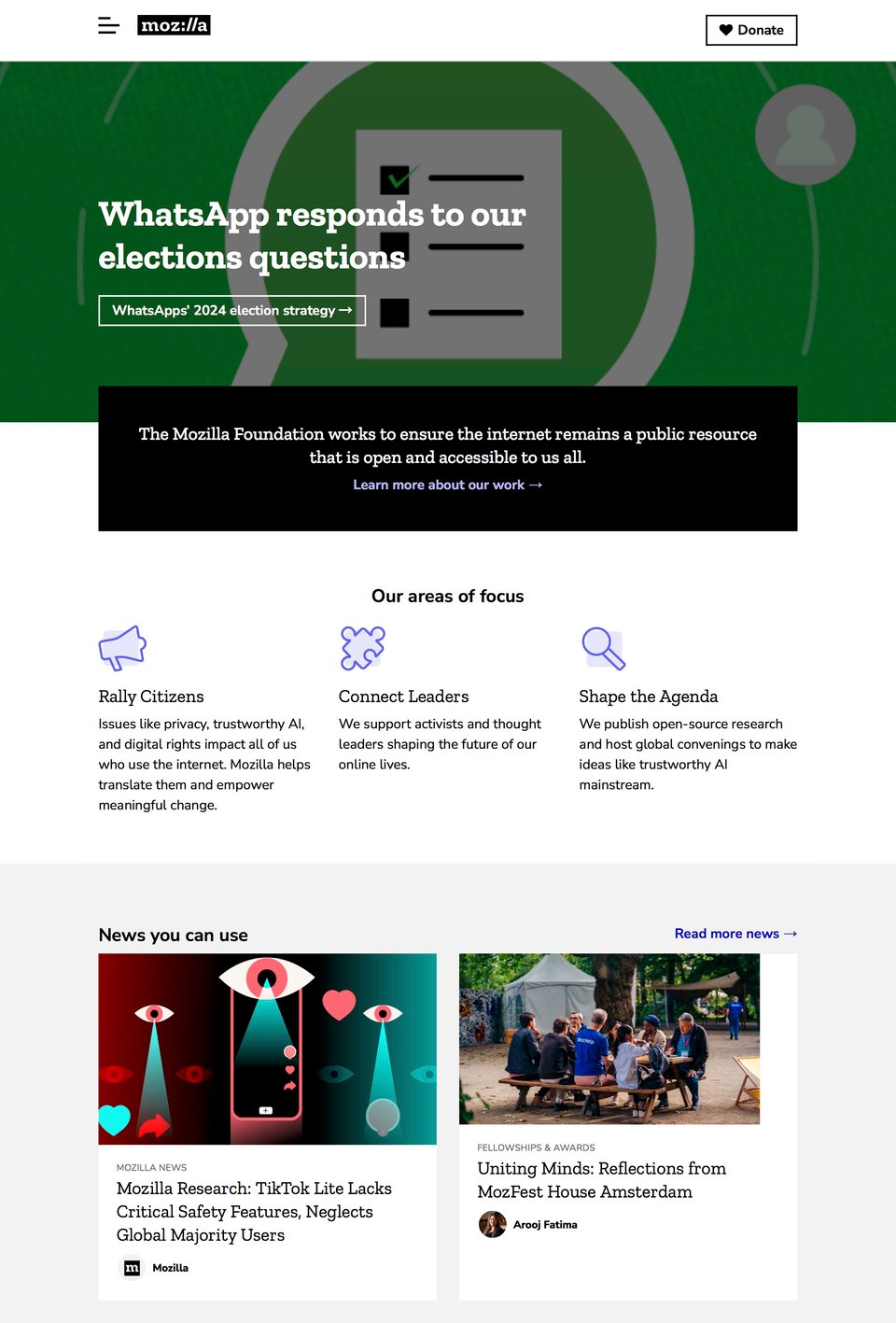Who Cares About Mozilla? (That…is a Really Important Question!)
It would be a devastating loss for the Web platform if Firefox faded into neglect and obscurity.
At any time in the last few years, I could have written “Mozilla is in trouble” and it would have felt timely and appropriate.
Yet it really does seem like this time, things are different. The writing is on the wall. Mozilla is facing a one-two punch which may leave it knocked out for good:
- The End of Search Payments 😱
- Nobody Cares 🥺
I wrote an article about the first problem for The Internet Review:
The overwhelming amount of income flowing into the organization comes from a deal to keep Google as the default search engine in Firefox. Bloomberg reported it accounting for a whopping 83% of Mozilla’s income in 2021, even while Firefox’s global market share cratered.
It was arguably never a wise decision to tie Mozilla’s fortunes to Google’s hip, and should a remedy eventually come about that Google is barred from making significant payments to other entities in order to maintain its monopoly in online search, the results would be catastrophic—that is if Mozilla doesn’t immediately plan to take steps to find alternate sources of revenue.
So that's a pretty significant conundrum in-and-of-itself, but layered on top of that is the reality that successful solutions may be hard to come by due to an equally thorny problem: nobody cares about Mozilla. (cue sad trombone)
Now that's not entirely fair to say. A small cadre of Web geeks (and yours truly is one of them!) cares deeply about Mozilla because we care about Firefox. The history of the Firefox browser is hugely meaningful, while the necessity of Firefox (and its underlying Gecko engine) remaining a viable alternative to Chrome, Edge, and Safari cannot be overstated. It would be a devastating loss for the Web platform if Firefox faded into neglect and obscurity. Likely it won't ever die, because most open source projects operating at this scale don't just poof! out of existence all of a sudden. But it very likely won't thrive if the parent organization of Mozilla doesn't stay afloat.
And there's the rub. Mozilla itself has failed as a brand. Seriously, snap question time: what's a successful Mozilla product that's not Firefox? Anyone? Bueller? Bueller?
In most people's minds who even know about Mozilla, Mozilla is Firefox and Firefox is Mozilla. Which is why we are constantly frustrated with the marketing and the messaging coming out of Mozilla because they don't seem to know this. If you go to Mozilla.org's homepage right now and scroll through, the amount of screen real estate taken up by information about Firefox is miniscule, and it's dwarfed by other stuff like "Mozilla AI" (whatever the fuck that is). In case you don't believe me, here's a screenshot where I highlighted in orange what is related to Firefox:

Yikes! 😬
But wait, there's more! If you know anything about Mozilla, you probably know that it's structured as a for-profit corporation that's owned by a non-profit called Mozilla Foundation. Thus you might be tempted to assume that surely, surely there's more of an emphasis on Firefox on the Mozilla Foundation's homepage because they have less need to promote shiny marketing materials for new money-making schemes.
Wrong!

I swear to god, I scrolled through the entire homepage of Mozilla Foundation searching for something—anything!—about the single product anyone even knows exists relevant to Mozilla called Firefox (it's a web browser, dontcha know), and guess what I found:
Nothing. Nada. Zero. Ziltch.
I can only conclude one thing: Mozilla has the absolute worst marketing in the history of companies who have a product which powers a significant portion of the Internet. (Sure, their marketshare has dwindled to like 2% or whatever, but that's still millions of users!)
It is asinine, almost malevolent. I can't explain it. I don't understand it. Yes, I know Mozilla doesn't "sell" Firefox, thus it can't directly make money from it, thus it needs to obtain revenue through other means. But have you ever stopped and asked yourself but…why?

Why isn't there a Firefox Pro? Why aren't there add-ons? Why isn't there an entire ecosystem of useful browser additions and integrations available for purchase? This is something which has perplexed me for years. Sure, they have a VPN or whatever, but that's not what I'm talking about. I want to pay for a good Web browser. Why can't I? If Firefox is in many ways only a browser for power users at this point, why is it a throwaway free product?
Jared you big dummy, it's because it's open source. Mozilla can't make money from Firefox because it's open source!
I think many, many other companies have successfully proven to be able to leverage open source to make money. Mozilla doesn't have to invent any new business models here…it's been done time and time again!
Again, I don't understand it. Seriously. If you have an explanation regarding this matter, please let me know because it is an utter mystery to me.
So this is a pickle to be sure, but to top it all off, Mozilla just announced suddenly it's shutting down its customized Mastodon instance, mozilla.social:
We’ve made the hard decision to end our experiment with Mozilla.social and will shut down the Mastodon instance on December 17, 2024. Thank you for being part of the Mozilla.social community and providing feedback during our closed beta.
Way to go earning good will from your most loyal potential customers. 🙄
Baffling.
But hey, Mozilla AI. Are we excited yet??

Nobody Said the Internet is Fair…But C’mon!

Like Jim Carrey in the infamous Liar Liar meme, we have been doing spittakes for years now watching Big Tech get away with murder when it comes to the abuse of power online. But finally…
Finally! 😅
The United States federal government is finally catching up to its counterparts in many other corners of globe in cracking down on Big Tech business practices which are deeply anticompetitive, consumer-hostile, and—dare I say it—unfair.
Corporations have been holding users' data, attention, and spending habits hostage in the name of eternally-inflating profits. This is no longer acceptable. Apple, Meta, Google, and other major tech companies are staring down the barrel of a regulatory body in many markets across the globe, and in some scenarios are losing lawsuits brought about by governments seeking to curtail illegal monopoly power.
Yes Google, You Are a Monopoly (Duh 🙄)
As mentioned above, Mozilla is in trouble because Google has been paying Mozilla a fuckton of money to keep Google as the default search engine (and Apple has similarly benefited from this sort of arrangement). And, well, that doesn’t sit well with regulators who see this as nothing more but the desperation of a monopoly to retain its market dominance and shut out all the competition. As CNN put it after the historic antitrust ruling in August:
The decision by the US District Court for the District of Columbia is a stunning rebuke of Google’s oldest and most important business. The company has spent tens of billions of dollars on exclusive contracts to secure a dominant position as the world’s default search provider on smartphones and web browsers.
Google of course denies it's a monopoly. In other news, Mark Zuckerberg denies he is the living embodiment of the “how do you do, fellow kids?” meme.
Google’s in hot water yet again as another antitrust lawsuit heads to court, this time regarding Google’s ad tech business:
“Control is the defining characteristic of a monopolist,” DOJ counsel Julia Tarver Wood said during opening statements in the federal government’s second antitrust trial against the search giant, which kicked off on Monday in Alexandria, Virginia. To the government, Google exerts too much control over every step of the way publishers sell advertising space online and how advertisers buy it, resulting in a system that benefits Google at the expense of nearly everyone else.
Arguably the issues at stake here are of even more concern to Google than search engine dominance, because Google’s ad tech business is literally how it makes eye-watering reams of cash, and it extends far beyond Google’s own platform domain—powering vast swaths of advertising across the entire Internet.
Lauren Feiner at The Verge continues:
Google’s tools play an essential role in the [programmatic advertising] process, with some of them holding about 90 percent of the market, according to the government. Google has a publisher ad server called Google Ad Manager (formerly DoubleClick for Publishers, or DFP), which helps publishers sell ad space. It operates an ad exchange, AdX, that facilitates transactions. And it owns an advertiser ad network, rounding out its trifecta of major products across different parts of the ad world.
It’s admittedly hard to imagine a world where Google doesn’t maintain staggering levels of market dominance over both search and ads online. And that’s the challenge for the DOJ and the courts, because any significant change to Google’s business in these key areas will send shockwaves rippling out across the technology, publishing, and marketing industries. Even actions taken with the best of intentions may result in unintended consequences (as the Mozilla example well proves).
Still, it’s increasingly hard to argue in good faith that nothing should be done. Google’s level of control over the basic communications and commerce conducted over the Internet is cause for alarm, and there’s no reason to believe the organic forces of a free market will have any significant ability to challenge that control.
Thus the long arm of the law enters the scene. And we will see soon enough if the long arc of the universe bends towards economic justice.